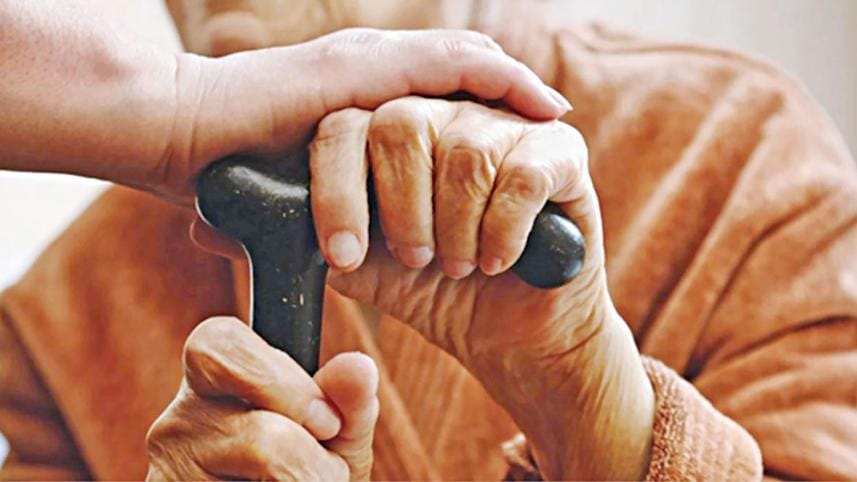The fear of realising that your parents are ageing

A few months ago my father came up to me to show a random YouTube video. Very common behaviour for him, nothing unusual about it. However, I was slightly preoccupied with another matter at the time, and I might have brushed it off casually without showing much interest. What happened next was completely unpredictable.
In an instant my father went through an array of what, to me, was absolutely inexplicable behaviour. He got angry, then upset, then hurt, and then angry again but this time with added emotions. Never in my over two decades of life had I seen my father behave in such a manner. My usual cool-headed Dad who had never even talked to me in a raised voice was suddenly being overwhelmingly sensitive.
Of course the altercation resolved itself and was forgotten soon, but it made me question some things. Had my father changed recently?
This seed of doubt made me start detecting changes in both my parents' behaviour that had previously not qualified as remarkable to me. I noticed their sudden mood swings, their heated responses to events which I was sure would not have previously garnered such reactions from them, and just an overall change in how they perceived things. It was like they had somehow become more rigid in their ways and less flexible or adaptable to their surroundings. They also doubted their own decisions more often, and strangely enough valued my input on their decisions in a way they never had before.
The physical changes had been coming on for a while, but somehow those were much more expected. I had always assumed that as time passed they would face greater adversity in health. Their pre-existing conditions of diabetes or cholesterol would exacerbate. They would probably succumb to much more serious ailments. The mental toll of ageing, however, had somehow snuck up on me. It was not overt. It was a subtle but definite shift, one that, for the first time, made me truly consider one of the most daunting questions of my life. Were my parents growing old?
How do you know if your parents are ageing? Do you remember the first time that thought occurred to you?
"I was video chatting with my parents one day about a concert I went to, when my mother asked who I had gone with. A perfectly normal question, except I had just told her that yesterday. That wasn't the first time she'd forgotten what I'd said," says Ariff*, 23.
"This one day I was working in my room when my Dad entered looking a little frazzled. He came up to me and demanded to know what his password for a particular online service was. I told him I had no idea. He said that he remembered explicitly telling me what the password was, and then proceeded to get mad at me for not remembering a random password that he may or may not have relayed to me ages ago. He accused me of not paying enough attention to him and not caring about anyone but myself and then left in a rage that was promptly forgotten fifteen minutes later," relays Rafsan*, 25.
"I was sitting in my parents' room while my mother was watching TV. Suddenly she pipes up in an affected voice, 'This movie is very realistic. This is exactly what happens in life. Children forget what parents did for them, and parents become a burden'. She was watching Baghban," states Rania*, 21.
Setting aside the fact that this movie is a three-hour-long guilt trip for anyone under the age of fifty, parents becoming much more temperamental as they age is an undeniable reality. It is a common saying that, as people age, they tend to actually revert to their child-like emotions. Somehow I hadn't ever imagined that I would see that happen in real time with my parents. In retrospect, I feel stupid for not expecting it.
Those who haven't quite faced this yet might be asking why something that's so natural seems so daunting. Well, imagine how you felt when you graduated high school or university. Take that feeling of uncertainty, multiply it by a million, and then throw that out the window, because it can't even start to compare to the real fear of losing your parents' oversight. Regardless of whether you are fifteen, twenty, or even fifty, having your parents around is an incomparable relief for most. Sometimes you don't realise it till it's gone, but subconsciously they are your ultimate safety net, even if you are at the point where you are taking more care of them than they are of you. I learned that from seeing my mother after both my grandparents had passed, even though she was a fully grown adult, with children of her own, who had been taking care of her mother for over a decade at that point.
In the end though, after I had finally processed my dread, I realised how exceptionally fortunate I was. Very few people get to notice their parents' ageing by observing such changes in behaviour. In the times we live in, a serious illness is much more likely to be the cause of one coming to that realisation. Furthermore, understanding that some of my parents' irrational behaviour was simply a by-product of the ageing process helped me be much more patient in my interactions with them. Of course that's a work in progress. I still lose my calm once in a while, but I'm getting better at it. And if I have to keep a document full of all their various passwords that they can never remember, well, I'd say it was perfectly worth it.
*Names have been changed for privacy.
Rabita Saleh is a perfectionist/workaholic. Email feedback to this generally boring person at rabitasaleh13@gmail.com




 For all latest news, follow The Daily Star's Google News channel.
For all latest news, follow The Daily Star's Google News channel.
Comments